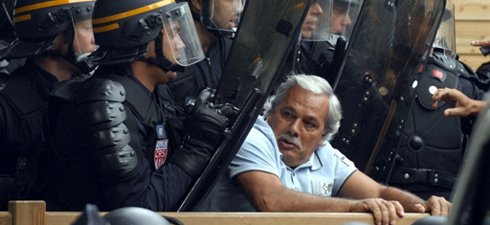With less than two years to go to the next presidential elections, Nicolas Sarkozy is attempting to set out the ground where that campaign will be fought. But by placing the issue of security at the heart of the debate, decrying illegal immigration and the presence of Roma in France, he is putting France squarely in the club of immigration extremists, countries whose domestic security policies are greatly influenced by the extreme right.
The "extremists"
In Italy, the issue of domestic security is synonymous with the fight against illegal immigration. Instead of thinking of this as radicalisation, it is sadly more a case of trivialisation. The Northern League, the xenophobic populist party of interior minister Roberto Maroni, one of the pillars of Silvio Berlusconi's coalition, has turned the issue into a government priority. The minister claims to have nearly ended the arrival of boatloads of illegals along Italian coasts (clandestine landing are down 88% on last year), after negotiating an agreement with Libya on sending them straight back from where they came. Nothing is said about those with legitimate claims for refugee status who are nonetheless sent back. Maroni is also pleased to have obtained changes in immigration policies sought by his party — making being a clandestine a crime, and the introduction last February of a point system tied to residence visas.
In the Netherlands, Geert Wilders has created a climate of mistrust that centres on questions of security, integration and Islam's place in society. The future government — without doubt a minority coalition of Liberals and Christian Democrats, supported from the outside by Mr Wilders — has added the fight against insecurity to its agenda. Mr Wilders also intends sending foreign delinquents back to their country of origin, as well as taxing those who wear the Islamic scarf.
In Switzerland, since its arrival on the national political scene in 1999, the Democratic Centre Union (UDC) has made its discourse even clearer. The country's leading party has identified "foreigners" as those who threaten Swiss values, be they refugees, day workers, radical Islamists or Roma. More than a quarter of Swiss voters admit having xenophobic leanings, which has obliged the more moderate parties on the right to also address these issues.
The "moderates"
In Germany, the politics of security are entirely devoted to the fight against Islamic terrorism and neo-Nazis. Its legislative arsenal has been built up since the attacks of 11 September 2001. In 2009, an extremely controversial bill was voted into law, allowing for the prosecution of a crime that is "in preparation". But for historical reasons, measures targeting specific ethnic groups are universally condemned by public opinion. Only the NPD, the tiny neo-Nazi party (less than 2% of registered voters throughout the federation), attempts to gain political mileage by attacking foreigners, which is seen even as a danger to democracy. Even so, problems with integrating the Turkish community has become a regular topic of debate throughout the country.
In Spain, the traditional line on security has been centred on the fight against ETA terrorism. To this, the socialist government of José-Luis Zapatero has added a much-publicised second: a war on violence against women. Even so, at the end of 2008, an "expulsion brigade for foreign delinquents" was created by the national police force, and the following year, 7,600 foreign delinquents were indeed expelled. The end of 2009 saw the reform of a law on the detention of illegals, extending the maximum stay in detention centres from 40 to 60 days. Apart from Catalonia's xenophobic Platforma per Catalunya party, founded in 2003, politicians rarely confuse the issues of immigration and delinquency.
The British
Conservative prime minister David Cameron intends to soften the "police state" reliance on electronic security to which the Labour government relied so heavily following the terrorist attacks of 2005 in London. He wants to regulate the use of the 4.2 million CCTV surveillance cameras that police British streets, and better protect the rights of free assembly. His "Great Repeal Bill" will also address the rules regarding the holding of fingerprints and DNA records.
Seen from Sofia and Bucharest
Deporting Roma is pointless and hypocritical
Just as 93 Roma are about to be deported from France in a blaze of publicity, the Romanian daily Evenimentul Zilei predicts that "the majority will return to France as quickly as possible". Without any concrete solutions on offer, "the problem will remain... after the teams of French journalists who have come to Bucharest for local-colour" have packed up and returned home. On the Bulgarian side, the dailyNovinar reproachesEuropean politicians for "applying a double standard to the Roma". It reminds its readers that a similar attempt by the authorities in Sofia to close an encampment of Roma was halted following pressure from the EU, and asks why those who reacted so vociferously at that time have not reacted against the French president Nicolas Sarkozy.
Was this article useful? If so we are delighted!
It is freely available because we believe that the right to free and independent information is essential for democracy. But this right is not guaranteed forever, and independence comes at a cost. We need your support in order to continue publishing independent, multilingual news for all Europeans.
Discover our subscription offers and their exclusive benefits and become a member of our community now!












